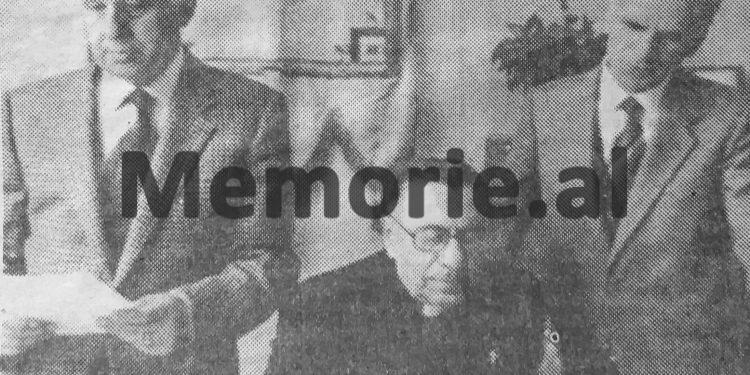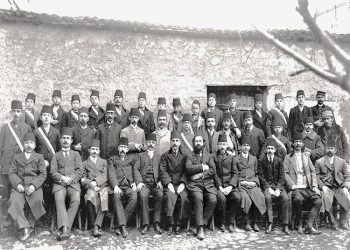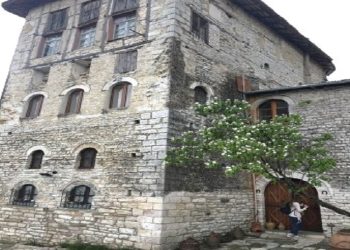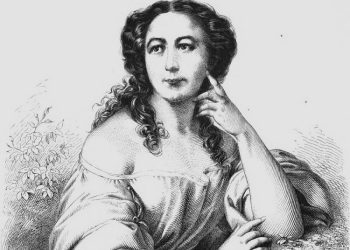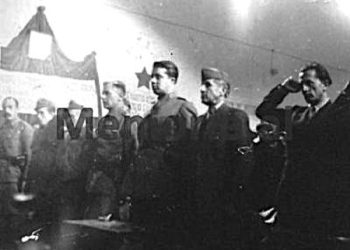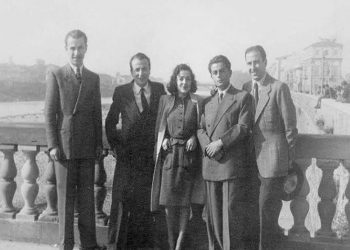Dashnor Kaloçi
Memorie.al publishes the unknown story of Dom Zef Shestani, originally from the city of Shkodra, who after finishing his studies at the Saverian College in his hometown, went to Padua, Italy, where he studied for six years and in 1935. Graduated in Theology at the University of that City, from where he would be appointed in his hometown in Shkodra, with the task of assistant – Parish Priest, in the Church of St. Kolli in the neighborhood “Little Rus”, where until at that time Dom Mikel Koliqi had served, who was charged with the duty of Parish Priest of Shkodra. Dom Zefi’s engagement, in the work for the education of the youth of that city, with the extracurricular circles grouped in the “Antonian Society” and that of the “Catholic Action”, where together with Father Gjon Shllaku who had graduated in Theology and Philosophy in Austria, became the idols of the youth of Shkodra, which in addition to religious teachings, they educated with love for the homeland. Rare testimonies of Zef Stakut, one of Dom Shtestan’s close friends, during the occupation, which shows how under his leadership, they signed the petition, against the Italian priest Fulvio Cordignano and then in complete illegality, they printed and distributed the anti-fascist magazine “Zani i Lirisë”. Dom Zefi’s engagement in the Antifascist Movement in the district of Shkodra, where together with his close friends, Dr. Bahri Kopliku, Lec Kurti, Ymer Lutfia, Frederik Shiroka, Zef Pali, Prenk Kaçinari and Rruzhdi Daca ”, he went to the mountains, fighting against the Italian invaders. His departure from Albania in 1944, to settle in Italy, where for almost 40 years, he headed the editorial office of the Albanian Language Section at Vatican Radio, which he held until 1988, when he left from there due to age and in his place, was named Gjon Gjonmarkaj.
“Laudetus Jesus Christ”. ‘Vatican Radio speaks to you in Albanian’. For almost 40 years, with his characteristic voice, he spoke to the Albanians, from across the Adriatic, where he had settled since the end of the War. Dom Zef Shestani, the rebel priest who left the ‘House of God’ to join the nationalist squads, carrying on his veladon the rifle with which he fought against the Italians in March 1951, was called to ‘Radio Vatican ‘, to run the’ Albanian Language Section ‘. It was the only Radio that kept alive the hope of the Catholic faithful in Albania, putting “pressure” on the communist regime of Enver Hoxha, who considered that Radio as the “main enemy” before the United States and the Soviet Union.
Who was Zef Shestani?
He was born in Shkodra on June 25, 1912, in a civic family, where his parents, a well-known believer throughout the city, decided to send Zefi to Saverian College, which at that time was known as one of the best schools in the world. The Balkans and beyond, because, among other things, there served a pedagogical body that was awarded in universities, the most famous theological and secular in Europe. After Zefi finished his high school studies at that college, his superiors decided and sent him to pursue higher religious studies in Padua, Italy. Systematic in the curricula, with the will and perseverance that was admired by all his peers, who were studying at that university, Zef Shestani, he would finish his studies, in the middle of 1935. By the end of 1935, he left the city of Padua, because of the ecclesiastical hierarchy, he would be appointed in his hometown, Shkodra, with the task of assistant – Parish Priest, in the Church of St. Kolli, of the neighborhood “Little Russian”. In that position, Dom Zef Shestani, was appointed after the appointment of Dom Mikel Koliqi, in the position of Parish Priest of Shkodra. A few days after arriving in his hometown, on Christmas Eve, he would celebrate the first Mass, exactly on the first day of the New Year 1936. From that moment on, Dom Zef Shestani would dedicate himself wholeheartedly to an event. comprehensive, in the city of culture and with ancient traditions, conveying to the people, in addition to the word of God, also his passion for the education of the new generation, who were part of the social circles of the “Catholic Action Society”, that he had undertaken to lead. Together with Father Gjon Shllaku, who led the “Antonian Society”, who for years became the idols of Shkodra youth, for their activity in educating young people, for the protection of the rights of the Albanian people?
Denounced the priest Fulvio Cordignano and went up the mountain, fighting against the Italian invaders!
In addition to being a devout cleric, Zef Shestani was also an ardent nationalist and it is a rare case, as he abandoned the religious order, which was entrusted to him by the Holy See of the Vatican and with a rifle in his hand, on the black veladon, came out on the mountain to fight against the Italian invaders. Regarding the anti-fascist activity of Zef Shestani, one of his closest friends and comrades, Zef Staku, from the city of Shkodra, recalls: “When I first entered Dom Zefi’s room, in the former cell of the Shkodra Parish, what impressed me most, was a quote written in Latin, which was embroidered on the top of the red and black national flag, which said: ‘Dulcem et decorum est pro Patria mori’ (Sweet and beautiful is to die for homeland). I was 18 then. We became friends immediately. I say we became friends, because me and my peers, Dom Zefi, despite being dressed as a priest, always treated us as friends, and maybe even from a young age. One day, during the fascist occupation, we went to the Archbishop together with Dom Zef Shestani and asked for Monsignor Gaspër Thaçi. We were told it was in the backyard of the Church. We went out there and found Monsignor Thaçi, sitting in an armchair of reeds. We kissed his hand, and then we had a short conversation. Monsignor Thaçi smiled at us and said: “I found out about our affairs… (he was talking about our anti-fascist activity), then I follow him seriously: go on, go on, because we are behind you and us”.
Dom Zefi was encouraged by Monsignor Gaspër Thaçi, as he was fully aware of his activity as an anti-fascist nationalist, from where he met Mit’hat Frashëri every time he came to the city of Shkodra. Dom Zefi was one of the first to denounce Fulvo Cordignano, (the Italian priest who was involved in politics), for his slander and anti-Albanian policy. In this regard, Zef Staku recalled: “The first event that made us enter into a close friendship with Dom Zefi, was the ‘Cordignano Scandal’, as beautifully defined by our friend Nik Barxolla, (literary nickname of Padre Nikol Mazrreku ), Dom Zef’s close friend. We students at the time were the first to petition (July 1941) and send it to Cordignano’s superiors. That petition was signed by the boys of the “Catholic Action” district of the Cathedral and those of the “Antonian Society” who at that time were led by Dom Zef Shestan and Father Gjon Shllaku, who helped us in our activity, in defense of the rights of the people Albanian. In May 1942, the magazine “Zani i Lirisë” began to be published in the city of Shkodra, which is known as one of the first magazines with anti-fascist content in Albania. This magazine, published by a group of young people from Shkodra with nationalist convictions, was published in complete illegality and had the great help and support of Dom Zef Shestani. For some time, we were forced to work at night in the cyclostyle, in the Catholic cemetery of Rrmaj. The idea to find such a safe place was given to us by Dom Zefi. After working all night by candlelight, we would go out in the morning and get together again. We did not go to our homes, but to the Church of St. Nicholas in Russia, where Dom Zefi served. After Mass, summer and summer, when we had done well, he would take us to his cell and say to Sister Alfonsina (an Italian nun): Out of joy, he began to sing lightly to himself. Sometime later, our group “28 nandori” (as it was later recognized), joined the ranks of the nationalist organization “Balli Kombëtar”. Dom Zefi himself was elected a member of the Shkodra Regional Committee. In this organization he collaborated closely with the well-known patriots Lec Kurti, Ymer Lutfia, Frederik Shiroka, Bahri Kopliku, Zef Pali, Prenk Kaçinari and Rruzhdi Daca “, recalled Zef Staku, one of Dom Zef Shestani’s closest friends.
In 1943, after being caught by the Italian authorities for his anti-fascist activity, Dom Zefi was forced to go underground, as he was in danger of being arrested by them. To escape persecution, he along with Dr. Koplik, Hasan Kazazi and Zef Logorecin, left the city and took refuge in the village of Zagora in Shkreli, where they remained until September 1943, when Benito Mussolini’s fascist Italy capitulated. While Dom Zefi and his two close associates were hiding in Zagora, Italian authorities raided his home and deported his mother. This action was taken by the Italian authorities after they had accurate information that Dom Zefi had joined a nationalist gang led by Ndue Pali.
Departure from Albania to Italy
From the middle of 1944, Dom Zef Shestani was forced to leave his hometown, Shkodra, and by a boat through Buna, he left for Ulcinj and from there, assisted by some of his friends from Ulcinj, he went in Italy. Arriving on the Apennine Peninsula, Dom Zefi appeared before the Vatican authorities to continue his religious activity, which he had been forced to discontinue because of his nationalist and anti-fascist beliefs. From the first days of his arrival in Italy, after the support he had from the Vatican, he publicly denounced the crimes of fascists and communists in Albania. During his stay in Italy, Dom Zefi did a colossal job in helping many anti-communist Albanians, who were forced to leave their homeland and find refuge in the neighboring country, through the numerous camps that were opened at that time to receive them. After some time in exile, he settled in Rome, where he created and led the “Committee for Albanians in Exile”. At the head of this committee, Dom Zefi, asked for help from the Italian state to help his compatriots, who were fleeing from Albania, due to their persecution by the communist regime in power of Enver Hoxha. It was during this period of time that Dom Shestani settled in Rome that he founded the magazine “Zani i Albanians in Exile”. In this body, with his writings and those of many other Albanian personalities, he made known to the world opinion on the crimes committed by the communist regime in power in Albania.
On ‘Radio Vatican’, he spoke for 40 years about Albania!
Seeing his journalistic activity and anti-communist convictions, Dom Zefi was summoned by the Vatican authorities, who proposed the position of head of the Albanian language editorial office at Vatican Radio. Thus, Dom Zefi, in October 1951, for the first time would speak on Vatican Radio, in Albanian, to his compatriots and to the Catholic faithful, who were persecuted by the communist regime in Albania. At this time, Dom Zefi was given the title ‘Monsignor’ by the Vatican. Likewise, the Holy See, seeing in him the protection of truth and human dignity, after giving him the title “Monsignor”, honored him with the honorary titles “Cameriere Segreto del Papa” and “Capelano Segreto del Papa”. Regarding the establishment of the Albanian Language Section at Radio Vatican and the colossal work of that radio for almost 40 years, Gjon Gjonmarkaj, one of Dom Shestan’s closest collaborators, recalls: “Towards the end of September 1951, the Secretariat of State of the Vatican, decided to restrict the Albanian language in the broadcasts of Vatican Radio. Among the Albanian priests in exile, Monsignor Zef Shestani was called to lead the Albanian Language Section. Thus, on October 3, 1951, at 21.00, with the theme “The Way of the Cross”, the first broadcast began, in our sweet language. The broadcasts continued from time to time, for some time with the same theme, which was then the leitmotif of all broadcasts (and not only in Albanian) of Vatican Radio. Undoubtedly, this decision was an invaluable gift of the Holy See to the Albanian people, and this fact was confirmed when communism in Albania was completely at the service of foreigners. Thus he incited the human carnage, to the knife of which they went, hundreds and thousands of proud people, among whom were also many clergy, from the three religious faiths they represented in Shqypni. The broadcast of Vatican Radio on the Albanian language, since that day, here not only in the service of the Holy See and the Pope, but also a spiritual food, for all Albanians in general. The people in the homeland, but also all Albanians wherever they were, received this broadcast, in their mother tongue with great joy, and with the deepest gratitude, to prove at the same time that the Holy See, not only had not forgotten “but he was always near them.” Since the creation of that editorial office of the Albanian language, Monsignor Shestani faced many difficulties that he was able to overcome, thanks to his will and great patience. After some time, he called and approached Zef Palin, Andrea Shulin, the nun Lucia Laca and Gjon Gjomarkaj. While one of the foreign collaborators who gave a great help to Dom Zef Shestan, was the Franciscan priest, Dom Daniel Gjeçaj (well-known writer and publicist who published under the literary pseudonym ‘Pal Dukagjini’). In the beginning, the editorial office of the Albanian Language section broadcast only three times a week, but afterwards, they became daily, selecting not only topics, of a religious nature, but also cultural-literary, social and humanitarian. At the head of the Albanian Language section, at Vatican Radio, Dom Zef Shestani, worked with great dedication and zeal for almost 37 years, until 1988, due to his age and health, he was forced to leave that position. . At that time, Gjon Gjonmarkaj (originally from the Captain’s House of Orosh, Mirdita) was appointed in his place, who continued to lead that section even after the 1990s.
Dom Zef Shestani, poet and musician!
In addition to religious activity, Dom Zefi has been very well known as a poet and musician. He showed those talents of his from a very young age, when he was in the benches of the Saverian College in the city of Shkodra. Regarding Dom Zef’s creative activity in the field of music, Tonin Zadeja from the city of Shkodra, recalled: “For Dom Zef Shestani, I want to express my considerations, for another sphere, almost completely forgotten, in his activity. I am talking about his musical creativity, which consists of a considerable number of songs of different types, which undoubtedly contain great artistic value. The songs created by Dom Zefi, immediately attracted the attention of the Shkodra public, especially the school youth. They had their own romantic and patriotic pathos, as well as clear national intonations. Although with an unsystematic musical technical preparation, thanks to his talent and dedication, he managed to create with a very original way of expression, which together with the musical creativity of Dom Mikel Koliqi and the slightly better known Father Bernardin Palaj, influenced in the musical tastes of some young composers from Shkodra. A good part of the songs composed by Dom Zefi, clearly carry the composer’s concerns regarding the developments of political and social events of the time (remember that Dom Zefi in most cases, is also the author of the lyrics of his songs ). Of particular interest are the songs created by Dom Zefi in the popular style, among which we remember the songs “Besa-besë” and “Karafili n’kodër”, which for the beauty of expression, quickly gained great popularity, in the city of Shkodra and beyond”.
Italians: “Dom Zefi, left a mark on the rock”!
For the years that Monsignor Shestani stayed in Italy, he left behind memories and impressions from the best, for all those who had the opportunity and luck to know him closely. In San Francesco Saveri, where Shestan served as parish priest, its inhabitants have hailed him with the highest consideration and to commemorate him, they have erected a memorial plaque, on which they have engraved his name. In the province of Boceha, where he had served, a local newspaper, among others (March 4, 1989), wrote: to transmit the word of God to the Albanian brothers, he would adapt in any way. Thanks to his many initiatives, Boçeha would become the first football team worthy of this name. Wise, educated, extremely polite in his role as a clergyman, he knew how to win in the span of a decade, the sympathies of those who, for the sake of a dark political campaign, would like to see in him, a “Don “The new Camilio.” The funeral of Monsignor Dom Shestani, in 1990, was attended by all Albanian diaspora in the world, as well as delegates from different countries of the world, with representation in the Vatican. “There are people who walk on the sand and leave no trace, but there are those who walk on the rock and leave indelible marks.”Dom Zefi was one of them, whose traces remained on the rock”, it was said on his grave, that afternoon in March, 32 years ago. Memorie.al







